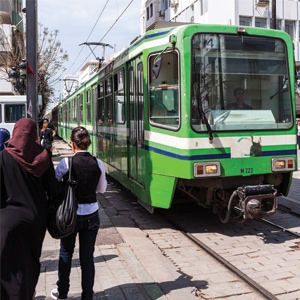Investors face economic uncertainty and jihadist threats, but the government has plans to attract more investment from foreign firms.
When the Arab Spring shook the Middle East in 2011, Tunisia came through with the least tumult, maintaining its parliamentary democracy in the face of

domestic unrest, multiple changes in leadership, inflation and high unemployment rates.
Still, foreign investors were nonplussed. “At least 500 foreign companies left Tunisia after 2011,” Fadhel Abdelkefi, Tunisia’s minister of development, lamented in a recent interview. “[Because] we spent five years working on democracy.”
Despite such efforts, successive governments have failed to resolve economic problems or successfully counter jihadist threats. The current government, headed by prime minister Youssef Chahed (after the one led by prime minister Habib Essid lost a no-confidence vote in July), is the seventh since the revolution. Unemployment and disillusionment have contributed to an exodus of between 22,000 and 25,000 Tunisians since 2011.
Certainly the most visible and dramatic problem stems from the activities of Islamist radicals. In October, Tunisian president Beji Caid Essebsi renewed the state of emergency first imposed a year earlier after a suicide attack on a bus carrying members of the presidential guard. That had followed two attacks on tourist sites in June: one at the resort of Sousse, where 38 foreigners died, and one at the Bardo Museum, in which 21 tourists died. Earlier this year, in March, an attack on army and police posts near the Libya border left at least 50 dead. These attacks—and a slowing European economy—produced a huge drop in tourism, normally a mainstay of the economy. Prime minister Chahed has warned of serious consequences, including austerity, job cuts, new taxes—and even possibly national bankruptcy.
Against this backdrop, FDI inflows dropped by more than 50%, from a high of $2.6 billion in 2008 to $1 billion in 2015. GDP growth dropped to 0.8% last year, with the final tally for 2016 unlikely to be very different. Realizing that FDI is even more important than before, the government put together a package of $50 billion, to be spent over five years on projects such as a port, desalination plants and energy projects, with some projects structured as public-private partnerships. In addition to fulfilling local needs, these projects provide employment that helps keep frustrated jobseekers from becoming radicalized, in the government’s view.
Leaders in the European Union, fearing an influx of refugees from Tunisia’s instability, have similar concerns. The EU announced in September that it would increase its annual financial assistance to €300 million ($328 million), with the money earmarked to deal with youth unemployment, social programs and assistance to companies. (The EU believes that instability in Tunisia could mean an influx of refugees into the EU.) The United Kingdom plans to continue providing numerous social, financial, economic, governance and media programs. The International Monetary Fund approved a $2.9 billion loan in September but criticized Tunisia’s slowness in dealing with public-sector wages and spending.
Another key to achieving success will be decisiveness, according to Anthony Kim, a policy analyst at the Washington, DC–based Heritage Foundation. “The whole political culture there is very much consensus-driven,” he says. “That’s respectable, but they need political decisiveness to move things forward, and unfortunately that’s not happening.”
|
Vital Statistics |
|
Location: North Africa |
|
Neighbors: Libya, Algeria, Mediterranean |
|
Capital city: Tunis |
|
Population: 11,107,800 |
|
Official language: Arabic |
|
GDP per capita (2015): $3872.5 |
|
GDP growth (2015): 0.8% |
|
Inflation (2015): 4.9% |
|
Currency: Tunisian Dinar |
|
Investment promotion agency: Foreign Investment Promotion Agency |
|
Investment incentives available? New law allows increased flexibility in transferring funds out of the country and removes some taxes |
|
Ease of Doing Business rank: 74 |
|
Corruption Perceptions Index rank (2014): 76 |
|
Political risk: Labor unrest and threat of strike over cuts; difficult and contentious municipal elections anticipated for 2017. |
|
Security risk: Fear that Tunisian terrorists will return home; border with Libya |
|
PROS |
|
Very pro-FDI environment |
|
Chabed has described problems and issues frankly |
|
US has doubled its military assistance program |
|
Highly trained labor force |
|
Cons |
|
Limited local capital available |
|
Serious labor unrest |
|
Damage to tourism industry will take years to repair. |
Sources: African Manager, Al Arabiya, ANSA, Atlantic Council, Maghreb Confidential, Middle East Confidential, Middle East Eye, Reuters, Transparency International, The Wire, World Bank, World Population Review
For more information on Tunisia, check out our Country Economic Reports at:
http://GFMag.com/gdp-data-country-reports.html



